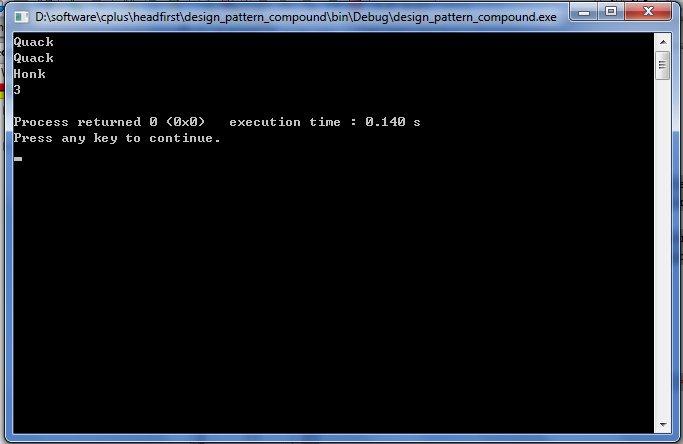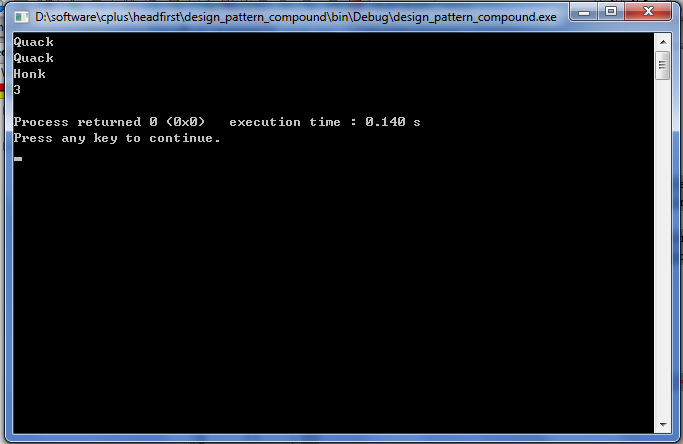design_pattern_compound
2015-03-09 21:20
351 查看
This post implements compound pattern in <Head First Design Pattern>. The examples are based on Duck classes.
Then, the decorator pattern, we need to count the number of quack, pay attention to the static variable and how it is initialized in main function.

Then we want to simplify client operation by using factory method to create ducks
We could create ducks with/without counting ability in a uniform interface. The main function becomes
#include <iostream>
#include <./duck.hpp>
#include <./duckfactory.hpp>
int QuackCounter::numquack = 0;
int main()
{
DuckFacotry* df = new CountingDuckFactory();
Quackable* mallardDuck = df->createMallardDuck();
Quackable* readheadDuck = df->createRedheadDuck();
Goose* goose = new Goose();
GooseAdapter * gduck = new GooseAdapter(goose);
Quackable* ggduck = new QuackCounter(gduck);
mallardDuck->quack();
readheadDuck->quack();
ggduck->quack();
std::cout << QuackCounter::getQuack() << std::endl;
return 0;
}The result is the same

class Quackable {
public:
virtual void quack() = 0;
};
class MallardDuck : public Quackable {
public:
void quack(){
std::cout << "Quack" << std::endl;
}
};
class ReadheadDuck : public Quackable {
public:
void quack(){
std::cout << "Quack" << std::endl;
}
};
class DuckCall : public Quackable {
public:
void quack(){
std::cout << "Kwak" << std::endl;
}
};
class RubberDuck : public Quackable {
public:
void quack(){
std::cout << "Squeak" << std::endl;
}
};First of all, the adapter pattern, we have a goose, therefore, we need a GooseAdapter:class Goose {
public:
void honk(){
std::cout << "Honk" << std::endl;
}
};
class GooseAdapter : public Quackable {
private:
Goose* goose;
public:
GooseAdapter(Goose* goose_):goose(goose_){}
void quack(){
goose->honk();
}
~GooseAdapter(){
delete goose;
goose = NULL;
}
};Then, the decorator pattern, we need to count the number of quack, pay attention to the static variable and how it is initialized in main function.
class QuackCounter : public Quackable {
private:
Quackable* duck;
static int numquack;
public:
QuackCounter(Quackable* duck_):duck(duck_){};
~QuackCounter(){
delete duck;
duck = NULL;
}
void quack(){
duck->quack();
numquack++;
}
static int getQuack(){
return numquack;
}
};The main function is#include <iostream>
#include <./duck.hpp>
int QuackCounter::numquack = 0;
int main()
{
Quackable* mallarDuck = new QuackCounter(new MallardDuck());
Quackable* readheadDuck = new QuackCounter(new ReadheadDuck());
Goose* goose = new Goose();
GooseAdapter * gduck = new GooseAdapter(goose);
Quackable* ggduck = new QuackCounter(gduck);
mallarDuck->quack();
readheadDuck->quack();
ggduck->quack();
std::cout << QuackCounter::getQuack() << std::endl;
return 0;
}
Then we want to simplify client operation by using factory method to create ducks
class DuckFacotry {
public:
virtual Quackable* createMallardDuck() = 0;
virtual Quackable* createRedheadDuck() = 0;
virtual Quackable* createDuckCall() = 0;
virtual Quackable* createRubberDuck() = 0;
};
class PureDuckFactory : public DuckFacotry {
public:
virtual Quackable* createMallardDuck(){ return new MallardDuck(); }
virtual Quackable* createRedheadDuck(){ return new RedheadDuck(); }
virtual Quackable* createDuckCall(){ return new DuckCall(); }
virtual Quackable* createRubberDuck(){ return new RubberDuck(); }
};
class CountingDuckFactory : public DuckFacotry {
public:
virtual Quackable* createMallardDuck(){
return new QuackCounter(new MallardDuck());
}
virtual Quackable* createRedheadDuck(){
return new QuackCounter(new RedheadDuck());
}
virtual Quackable* createDuckCall(){
return new QuackCounter(new DuckCall());
}
virtual Quackable* createRubberDuck(){
return new QuackCounter(new RubberDuck());
}
};We could create ducks with/without counting ability in a uniform interface. The main function becomes
#include <iostream>
#include <./duck.hpp>
#include <./duckfactory.hpp>
int QuackCounter::numquack = 0;
int main()
{
DuckFacotry* df = new CountingDuckFactory();
Quackable* mallardDuck = df->createMallardDuck();
Quackable* readheadDuck = df->createRedheadDuck();
Goose* goose = new Goose();
GooseAdapter * gduck = new GooseAdapter(goose);
Quackable* ggduck = new QuackCounter(gduck);
mallardDuck->quack();
readheadDuck->quack();
ggduck->quack();
std::cout << QuackCounter::getQuack() << std::endl;
return 0;
}The result is the same

相关文章推荐
- design_pattern_compound
- 设计,看上去很美!——“Design & Pattern”团队的第一块砖
- head first design pattern笔记整理
- Design pattern learning I: Facade pattern
- Iterator Design Pattern
- Book Review about Head First Design Pattern 4
- Null Object Design Pattern
- design pattern tips
- Design pattern summary 1
- proxy design pattern,java advanced feature
- C++版的Head First Design Pattern
- 观察者模式(一)--《Head First DesignPattern》
- java design pattern
- design pattern——command
- Reading Head First Design Pattern note.
- Strategy design pattern
- MVC design pattern in our project, the Order system
- Design Pattern Chain of Reponsibility 责任链模式
- 《设计模式--基于C#的工程化实现及扩展》 Security Design Pattern 系列 3 检查点模式(Check Point)
- 《Head First Design Patterns》笔记七:适配器模式(Adapter Pattern)
